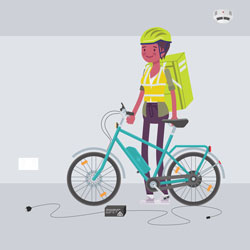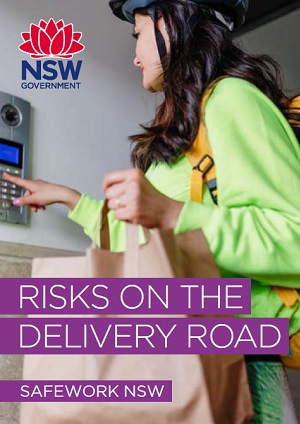Food delivery industry
Learn more about the work health and safety laws that apply to food delivery platforms and workers in New South Wales.
Together, say ‘no way’ to taking risks when delivering food or drink.
The food delivery industry involves the ordering and delivery of food and drinks from restaurants, cafes, kitchens, service stations and other food providers, to members of the public by workers who transport food using a car, bicycle, motor scooter or motorbike. This industry sits within the rapidly growing gig economy.

Charge your e-bike safely
- charge e-bikes while you’re home and don’t charge e-bikes while you sleep
- charge batteries on hard surfaces like concrete floors or tiles
- install working smoke alarms in rooms where you charge or store your e-bike
- always use the charger that came with the e-bike
- do not charge your e-bike in or near your bedroom or living room.
Learn more about lithium-ion battery safety

Managing WHS in the food delivery industry
This guide is for workers in food delivery services, including food delivery platforms, food outlets and food delivery riders. It's designed to help you meet your obligations under WHS laws in NSW.
Laws for riders and platforms
Personal Protective Equipment
All food delivery booking providers (platforms) are required to supply food delivery riders (riders) with:
- high-visibility personal protective equipment (PPE), including a retroreflective outer clothing item and a bag or container for safely transporting food or drink.
- the garment and the delivery bag must comply with the relevant Australian Standard
- a platform does not need to provide PPE if the rider is able to use PPE already provided by another platform.
While delivering food or drink, all riders are legally required to use or wear the PPE that has been provided to them.
Training
All platforms are required to provide riders with induction training before they allow a rider to work for their platform. This induction must include training on:
- hazard and fatigue management
- road safety
- use of PPE
- work health and safety duties and obligations.
It is recommended that records are kept of this to enable platforms to prove compliance.
Training verification
All platforms must provide each rider with a training record which verifies that the rider has successfully completed induction training.
The verification record can be in any format that the platform chooses (i.e., physical card, digital page, email, in-app feature), and must contain the following information:
- the rider’s name, address, date of birth and photograph
- the date on which the rider completed their training
- the date on which the rider was provided with their PPE.
All riders are legally required to make the training verification record issued available for inspection by an inspector or a police officer.
Record keeping
When providing induction training, platforms must maintain records of:
- the name of the rider who has completed the training
- the date the training was provided to the rider and the date it was completed
- the content of the training (i.e., the modules that it covered and information that was provided).
When providing PPE to a rider, platforms must maintain records of:
- the name of the rider provided with PPE
- the date the PPE was provided to the rider
- detail of the PPE provided (i.e., type of PPE).
These records must be kept for a period of five years.
If SafeWork NSW makes a written request for a record, platforms must provide a copy within five days.
Compliance
Penalties and fines will apply to platforms who cannot demonstrate that they have met these requirements. The penalty amounts are set out in the Regulation.
Should a rider fail to wear the PPE provided or have their training verification record available then they could receive an on-the-spot fine of $144. View the full WHS Amendment (Food Delivery Riders) Regulation 2022.
Read the SafeWork NSW Regulatory approach to NSW work health and safety legislation – Food Delivery Riders.
Joint Taskforce: FoodDelivery Rider SafetyJoint Taskforce: Food Delivery Rider Safety
In November 2020, the then Hon. Minister for Better Regulation and Innovation, Kevin Anderson announced the establishment of a Joint Taskforce (Taskforce) to explore the recent deaths of food delivery riders and identify safety improvements for the industry. Over the next six months, the Taskforce moved through four stages of delivery: a roundtable forum; industry consultation and commitment to developing an action plan; a compliance program; and reporting.
Year in review
Following the Taskforce, SafeWork NSW provided an overview for food delivery rider safety including the number of incidents, industry achievements and resources available to improve safety.
Final report
The Taskforce's final report outlines the recommendations of the Taskforce to promote compliance within the sector and further protect riders from death or serious injury.
Industry action plan (IAP)
The IAP was developed through collaboration between partners and government and highlights the specific activities conducted, over a 12 month period, to improve the health and safety of food delivery riders.
Data Intelligence Reports
The Taskforce data intelligence report provides an overview of the industry with snapshot reports released quarterly, over a 12 month period, to monitor the industry.
- Data Intelligence Report snapshot: January – March 2022 (PDF, 207.77 KB)Data Intelligence Report snapshot: October – December 2021 (PDF, 190.4 KB)
- Data Intelligence Report snapshot: July – September 2021 (PDF, 222.79 KB)
- Data Intelligence Report snapshot: April – June 2021 (PDF, 257.22 KB)
- Data Intelligence Report: March 2021 (PDF, 1214.05 KB)
Top causes of injury
Workers in the food delivery industry use a range of transportation, including bicycles, e-bikes, motorcycles, and cars. Risks to workers vary depending on the type of transportation they use. But, across the industry, common causes of injuries are:
- vehicular collisions
- road hazards
- unsafe and/or incorrect use of bicycles and e-bikes
- use of unsuitable equipment
- abuse or assault by a member of the public
Common hazards
Workers in the food delivery industry are at risk of injury or illness while working. They face the challenges of working outdoors (in all of types of weather and conditions), navigating the roads, and interacting with members of the general public.
To help you get started, we’ve prepared information on how to identify hazards and manage the risks common to the industry including:
- principles of good work design – SafeWork Australia
- traffic and road hazards
- environmental hazards
- violence
- fatigue
- unsuitable equipment
- hazardous manual tasks
- slips, trips and falls
Related information
- New standards for lithium-ion batteries in e-micromobility devices coming February 2025 – NSW Fair Trading
- Battery and charging safety (e-bikes and e-scooters) – Fire & Rescue NSW
- Gig economy – SafeWork NSW
- Food delivery riders – Centre for Road Safety – Transport for NSW
- E-bikes – Centre for Road Safety (Transport for NSW)
- Bicycle riders – Centre for Road Safety (Transport for NSW)
- Gig economy roles and responsibilities in WHS – Centre for WHS
- How-to guide: Design your own behavioural messaging campaign to improve food delivery worker work health and safety (PDF) – Centre for WHS